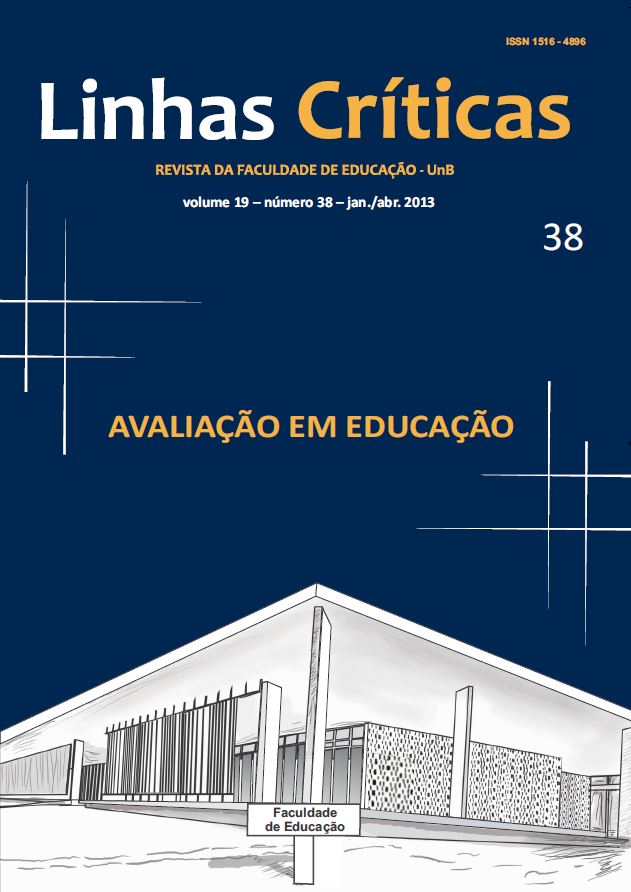Young apprentices’ perceptions about the processes of teaching and learning
DOI:
https://doi.org/10.26512/lc.v19i38.4099Keywords:
Processes of teaching, Processes of learning, Teaching resources, Teaching strategy, Young ApprenticeAbstract
The present investigation refers to adolescents’ perceptions of the Young Apprentice Program (YAP), on classes considered “boring” and “cool” in a vocational school, in Florianópolis (SC). The objective was to understand and analyze the perceptions of young apprentices on the processes of teaching and learning, and the present qualitative indicators which assist in teaching activities. In collecting data, we have used the focus group with ten adolescents. For the young apprentices the “boring” class is focused on the transmission and reception of knowledge. And a “cool” class is when it is used teaching strategies such as motivation and accessible language.Keywords: Processes of teaching.
Downloads
References
ANASTASIOU, Léa das Graças Camargos; ALVES, Leonir Pessate. Processos de ensinagem na universidade: pressupostos para as estratégias de trabalho em aula. Joinville: Univille, 2004.
BAUER, Martin; GASKELL, George. Pesquisa qualitativa com texto, imagem e som: um manual prático. Rio de Janeiro: Vozes, 2002.
COLL, César. Aprendizagem escolar e construção do conhecimento. Porto Alegre: Artes Médicas, 1994.
COLL, César. Linguagem, atividade e discurso na sala de aula. In: COLL, César; MARCHESI, Álvaro; PALACIOS, Jesús. Desenvolvimento psicológico e educação: psicologia da educação escolar. 2. ed. Porto Alegre: Artmed, 2004. p. 261-279.
COLL, César; SOLÉ, Isabel. Ensinar e Aprender no contexto da sala de aula. In: COLL, César; MARCHESI, Álvaro; PALACIOS, Jesús. Desenvolvimento psicológico e educação: psicologia da educação escolar. 2. ed. Porto Alegre: Artmed, 2004. p. 242-260.
COUTINHO, Laura Maria Coutinho. Cinema e educação: um espaço aberto. Salto para o futuro. TV Escola: 2009. 38 p. vol. 4. Disponível em: <http://tvbrasil.org.br/fotos/salto/series/185114Cinemaeedu.pdf>. Acesso em: 18 jan. 2012.
DELIZOICOV, Demétrio; ANGOTTI, José André; PERNAMBUCO, Marta Maria Castanho Almeida. Ensino de ciências: fundamentos e métodos. São Paulo: Cortez, 2002.
MARTÃN, Elena; MAURI, Teresa. As instituições escolares como fonte de influência educacional. In: COLL, César; MARCHESI, Álvaro; PALACIOS, Jesús. Desenvolvimento psicológico e educação: psicologia da educação escolar. 2. ed. Porto Alegre: Artmed, 2004. p. 389-402.
PALACIOS, Jesús; OLIVA, Alfredo. A adolescência e seu significado evolutivo. In: COLL, César; MARCHESI, Álvaro; PALACIOS, Jesús. Desenvolvimento psicológico e educação: psicologia evolutiva. 2. ed. Porto Alegre: Artmed, 2004. p. 309-322.
POZO, Juan Ignacio. Aprendizes e mestres: a nova cultura da aprendizagem. Porto Alegre: Artmed, 2002.
POZO, Juan Ignacio; CRESPO, Miguel Ángel Gómez. A aprendizagem e o ensino de ciências: do conhecimento cotidiano ao conhecimento científico. 5. ed. Porto Alegre: Artmed, 2009.
SCHMITZ, Egídio. Fundamentos da didática. São Leopoldo, RS: Ed. Unisinos, 1993.SENAC/SC/CSDS. Programa Jovem Aprendiz: orientação aos empresários. Florianópolis: Senac/SC, 2009. 4ª Versão. 56 p.
TOSI, Maria Raineldes. Didática geral: um olhar para o futuro. Campinas, SP: Alínea, 2001.
VASCONCELLOS, Celso dos Santos. Construção do conhecimento em sala de aula. São Paulo: Libertad, 2005.
VERGARA, Sylvia Constant. Métodos de pesquisa em administração. 2. ed. São Paulo: Atlas, 2006.
Downloads
Published
How to Cite
Issue
Section
License
Copyright (c) 2016 Linhas Críticas

This work is licensed under a Creative Commons Attribution 4.0 International License.
Authors who publish in this journal agree to the following terms:
-Authors maintains the copyright and grants the journal the right of first publication, the work being simultaneously licensed under the Creative Commons Attribution License which allows the sharing of the work with recognition of the authorship of the work and initial publication in this journal.
- Authors are authorized to enter into additional contracts separately, for non-exclusive distribution of the version of the work published in this journal (eg publish in institutional repository or as a book chapter), with acknowledgment of authorship and initial publication in this journal.
-Authorers are allowed and encouraged to publish and distribute their work online (eg in institutional repositories or on their personal page) at any point before or during the editorial process, as this can generate productive changes as well as increase the impact and the citation of published work (See The Effect of Free Access).



